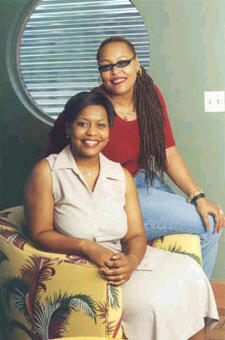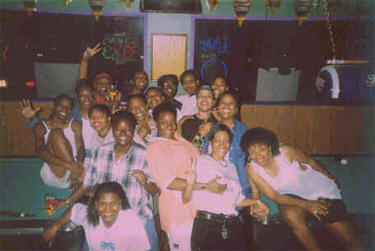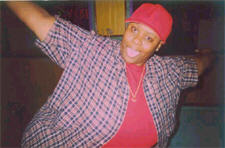 |


|
|
An Interview with Summer Blanding |
|
Interview By Raj Ayyar
As she spoke eloquently about HIV disease, racism, homophobia and the culture of denial in the U.S., there was this unquenchable joy of being that came through in the twinkling eyes, the sharply apropos response to an audience question and in her gestures and body language. I was reminded of what someone once said about Ella Fitzgerald: that oppressive Jane and Jim Crow laws could not dampen her fierce inner affirmation of life that bubbled up and out of her, whatever the odds. Many moons later, when Brevard Community College was dimming into memory for both of us, I ran into Summer Blanding again at the Gay-Lesbian-Bisexual-Transgender Center (GLBT) in Orlando, Florida. The student activist had blossomed into a multi-faceted woman, constantly reflecting on the multiple dimensions of her being---as a gay woman, an African-American and as someone who was fully out to herself and her life-world. She writes an ongoing column called Sistah Talk for a local gay publication, facilitates a group for women of color at the GLBT center, is working on a book, and does grass roots activist work with an organization called the National Conference on Community and Justice, an organization that actively challenges and educates the community about racism, homophobia, sexism, ageism and internalized prejudices of different kinds. I thoroughly enjoyed our timeless Sunday afternoon exploring many issues and discussing multiple strategies of change… Raj Ayyar: Tell us a little about yourself before and after your move to Orlando. Summer Blanding: Orlando was quite a culture shock. I was always out to myself, but for the first time I came out to my family and found a rich extended GLBT family here in Orlando. It's been exciting and scary to move out of so many different boxes and comfort zones. When I was living in small town Central Florida, I was acutely aware of blatant racism, sexism and homophobia all around me, everywhere I turned. I have been called “nigger” and been patronized and insulted by many within and outside my own community. The flip side of that was the way in which I was sex-objectified by many White males in high school who saw me as 'sexy tits and ass.' I had to learn to move out of that mould---of being valued or denigrated for being a young African-American female and to embrace the more positive female role models in my own family. Finally, the self-esteem I learned from my mother and other women in my family had to be extended to a full acceptance of my sexual identity as an integral part of who I am. It's not been easy coming out to my family. I've faced hostility, rejection and fear from members of my family and community. Even my mother who is very supportive of me hopes and prays that my lesbian identity is “just a phase” from which God will deliver me!
 Raj Ayyar: Many White folks tend to minimize racism or to relegate it to a dim distant past best forgotten. What's your response to that?
Raj Ayyar: Many White folks tend to minimize racism or to relegate it to a dim distant past best forgotten. What's your response to that?
Summer Blanding: Yes, that's certainly true. It's very clear that White folks are often in denial of the fact that such great racist cruelty could occur historically and still exists in the United States. Raj Ayyar: Many Whites are still defensive about slavery. Summer Blanding: What tends to be forgotten is that slavery completely stripped the early African-Americans of any sense of dignity or identity. It wiped out their culture, religion and family structures. In some ways the mind set of slavery is still with us, perhaps in slightly subtler forms. You've only got to look at the appalling ways in which African-Americans are racially profiled by cops in New York and elsewhere, and at the incredible statistics of Black people in jail and on death row to realize that. Most of them are young African-American males. Often, someone who does or deals in drugs gets a stiffer sentence than a rapist. When I bring up such issues, there are many who say 'oh well, drugs are a serious problem in our society', completely ignoring the racist agendas behind such arrests. To me, it's an issue of being able to live as a whole person without constant threat whether you're walking the street or applying for a job or whatever else. Raj Ayyar: Do you feel that as an African-American woman you're the bottom of the socio-economic totem pole? Alice Walker's 'Color Purple' sees the African-American woman as the target of White and Black male oppression. In fact, it could be argued that Celie and Shug drift into a wonderful lesbian relationship tinged with love, mysticism and magic, in part because of abuse from White and Black males alike.

Summer Blanding: Interesting that you brought that up. I've always believed that the Black woman is the bottom of the totem pole. Black women are taught to cook, clean and nurture their men, to be their 'mama', while white society expects you to play 'Mammy', the nice mothering soul who never asks uncomfortable questions. The minute you're perceived as assertive, different or confrontive, then you become the Black villain. I've often been criticized, attacked or ostracized by members of my own community as well as by many Whites for refusing to play 'mama' or 'Mammy.' When I tell my menfolk (Black males) that I'm an independent woman and a lesbian it's very threatening to many of them. They feel castrated. Raj Ayyar: Don't you think that some of this comes from the sundering of the African-American family going back to slavery times? Part of this sundering is that the Black male often had no male role model other than the machismo of the White plantation owner. Summer Blanding: That's certainly true. So, in a sense, these brothers who are threatened by someone like me are themselves victims of oppression. Raj Ayyar: What is your relationship with the Black church? Summer Blanding: I am very strongly rooted in the Black Protestant tradition. Certainly when you think of the joy, the call-response rhythm of the service and its enormous impact on the lives and traditions of the African-American community, the Black church is the nerve center, the heart and yet---- Raj Ayyar: Without that rich tradition of the Black church, there would not have been a focus, a community or any sense of deliverance from bondage for African-Americans dealing with centuries of oppression. Also, let's not forget that this form of Christianity, unlike its stiffly Puritanical and often bigoted White counterpart, did inspire the whole tradition of African-American music including Blues, jazz, Soul and it snakes its way into rock'n'roll via R&B. If hip hop in some of its current avatars lacks the healing and hope of the earlier musical forms, it's still haunted by the absence of that church-inspired tradition.
Summer Blanding: I love and respect Cornel West very much! Raj Ayyar: So do I. Cornel is not a cheap little born again white fundamentalist bashing the GLBT community or Buddhists or whatever else a la Pat Robertson, Jerry Falwell and their minions of the racist, sexist, homophobic Religious Reich. He is a deeply reflective Harvard intellectual with new spins on everything from Jesse Jackson to the largely fuddy duddy middle class American philosophy known as 'pragmatism'. Cornel has recently spoken of the decline of the Black church and its growing irrelevance not only to the hip hop generation but to many sections of the African-American community. Summer Blanding: An irrelevance that's driving many to the Nation of Islam and to other faiths. Raj Ayyar: Consider bell hooks' off-beat Buddhism. Switching to a different topic, do you think that sexism is a major root cause of homophobia? Is homosexuality seen as a betrayal of gender and gender privileges by the homophobe? Summer Blanding: Most definitely. I see sexism as a root cause as well as a weapon in the service of homophobia. The gay male, the lesbian, the transgender person are viewed as traitors to their own gender and so aren't 'really' men or 'really' women. Raj Ayyar: That's a line of thinking shared by many queer intellectuals and activists from Jack Nichols in Men's Liberation to Brian Pronger in The Arena of Masculinity. Yet, as we know, many heterosexuals engage in homosexual acts from time to time….
Raj Ayyar: You know, the identity issue raises some interesting questions. After all, heterosexual identity is never questioned, problematized or policed! Summer Blanding: Yeah, no one says 'oh, you're straight. Let's see: were you abused as a child or too close to Mom or Dad? Is it a preference or an orientation? When did you first notice that you were attracted to the opposite sex?' Raj Ayyar: The feminist sociologist Peggy Macintosh talks about 'invisible White privilege'. Is there such a thing as invisible heterosexist privilege? Summer Blanding: Absolutely. Heterosexuals never have to explain or justify themselves and can take all kinds of protection and societal support for granted. Raj Ayyar: What about lookism and ageism within the GLBT communities? After all, this appears to be tied into the practices of the fast-paced, 'use and dispose' consumerism of contemporary American society. Sappho had many young mentees and lovers and the Platonic Socrates enjoyed the company of young men who adored him and vice versa. Neither of them could be called a 'Castro clone'! Summer Blanding (laughs): I don't think they were into Chanel 5, Tommy Hilfiger or any kind of faddist look young approach to life. The problem with many lesbians and others in today's America is that they judge others by looks, youth, designer clothes and rigid perfomance roles like 'butch' and 'femme'. It's so shallow. Raj Ayyar: Recently, I was appalled to discover that Florida's answer to Jesse Helms, our very own state Representative Allan Trovillion, verbally abused a pro-active gay teen group (Galixy) and subjected them to a hate-filled fundamentalist harangue when Chris Vasquez and others went to Tallahassee seeking protection for gay teens in the Orange county school system. Summer Blanding: Galixy and other groups have done a wonderful job of challenging ageism and bigotry and articulating the issues of GLBT teenagers and young adults. As you know, 70% of GLBT high school students are harassed at least 12 times a day according to a recent study. They have tremendous problems coping with abuse and heterosexist privileging by teachers and administrators, not to mention pressure from parents, churches, peers and the media. They are at very high risk for suicide. GLBT teens and young adults need safe spaces in school and need to be protected from violence and abuse. Raj Ayyar: Unfortunately, the Right tends to reduce that need to 'special interest' lobbying. Summer Blanding: With this stolen election and Dubbya at the helm, we're going to witness more and more of that kind of rhetoric and downright hate-mongering. This is why it's imperative that all liberal and progressive groups need to bury petty hatchets and think about coalition politics. NOW and NAACP have made great strides in that direction. We simply cannot afford the luxury of separatist politics or of fighting each other on hair-splitting differences. On the other hand, we need to make sure that these coalitions are authentic, so no group is patronized or left out in the process. Raj Ayyar: Summer, it's been a pleasure and a joy re-connecting with you. Summer Blanding: Likewise, Raj. |

© 1997-2002 BEI
 I first met Summer Blanding some years ago at a World AIDS Day event at a small Central Florida community college. The first thing that struck me about this young African-American activist was her vibrancy, a vibrancy that came from a strange inner joy.
I first met Summer Blanding some years ago at a World AIDS Day event at a small Central Florida community college. The first thing that struck me about this young African-American activist was her vibrancy, a vibrancy that came from a strange inner joy.
 Summer Blanding: It's when you admit and embrace any kind of gay-lesbian-bisexual-transgender identity that you're seen as a threat, as a gender traitor and bashed, demeaned or harassed.
Summer Blanding: It's when you admit and embrace any kind of gay-lesbian-bisexual-transgender identity that you're seen as a threat, as a gender traitor and bashed, demeaned or harassed.